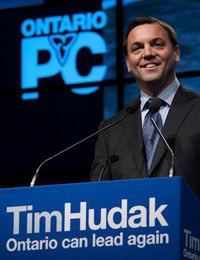 QUEEN’S PARK – The provincial Progressive Conservatives are upset at the McGuinty Government. “Dalton McGuinty’s failed stabs at public sector wage restraint have created divisions not just between public and private sector workers, but also within the ranks of the public service itself”, charges Ontario PC Leader Tim Hudak. Hudak made the claim during an Ontario PC Caucus session to discuss ideas for tackling Dalton McGuinty’s jobs and spending crisis – including a mandatory public sector wage freeze.
QUEEN’S PARK – The provincial Progressive Conservatives are upset at the McGuinty Government. “Dalton McGuinty’s failed stabs at public sector wage restraint have created divisions not just between public and private sector workers, but also within the ranks of the public service itself”, charges Ontario PC Leader Tim Hudak. Hudak made the claim during an Ontario PC Caucus session to discuss ideas for tackling Dalton McGuinty’s jobs and spending crisis – including a mandatory public sector wage freeze.
“The last thing our public sector workers need now is for this cynical government to pit them against each other,” Hudak said. “Yet by freezing non-union versus union salaries, that is exactly what’s happened.”
As evidence, Hudak cited an OPSEU website item posted after 95 employees at Hamilton Health Sciences (HHS) joined the union in October 2011: “A large factor in the vote (was) the current wage freeze legislation for non-unionized public sector workers. The non-union workers at HHS saw the benefits enjoyed by the OPSEU-represented employees… currently working at HHS.”
This scenario will have been repeated countless times in public sector workplaces across Ontario since the non-union wage freeze was imposed, Hudak said. “In the process, Dalton McGuinty created an unfair two-tier compensation scheme, played some workers off others and kicked off a union recruitment drive.”
McGuinty has also divided public and private sector workers in Ontario, Hudak said, as seen in a Canadian Federation of Independent Business report showing government employees earn 27 per cent more than their private sector counterparts in a similar job when benefits are factored in. “Fiscal responsibility of this sort will lead to balanced budgets,” Hudak said. “That will bring a return to prosperity, lower taxes, and the money we need for programs and services we all value, like health care and education”.
“To that end – and at a time when 560,000 Ontarians are out of work – it’s only fair for public sector workers to share in the sacrifices their private sector colleagues are already making.”
